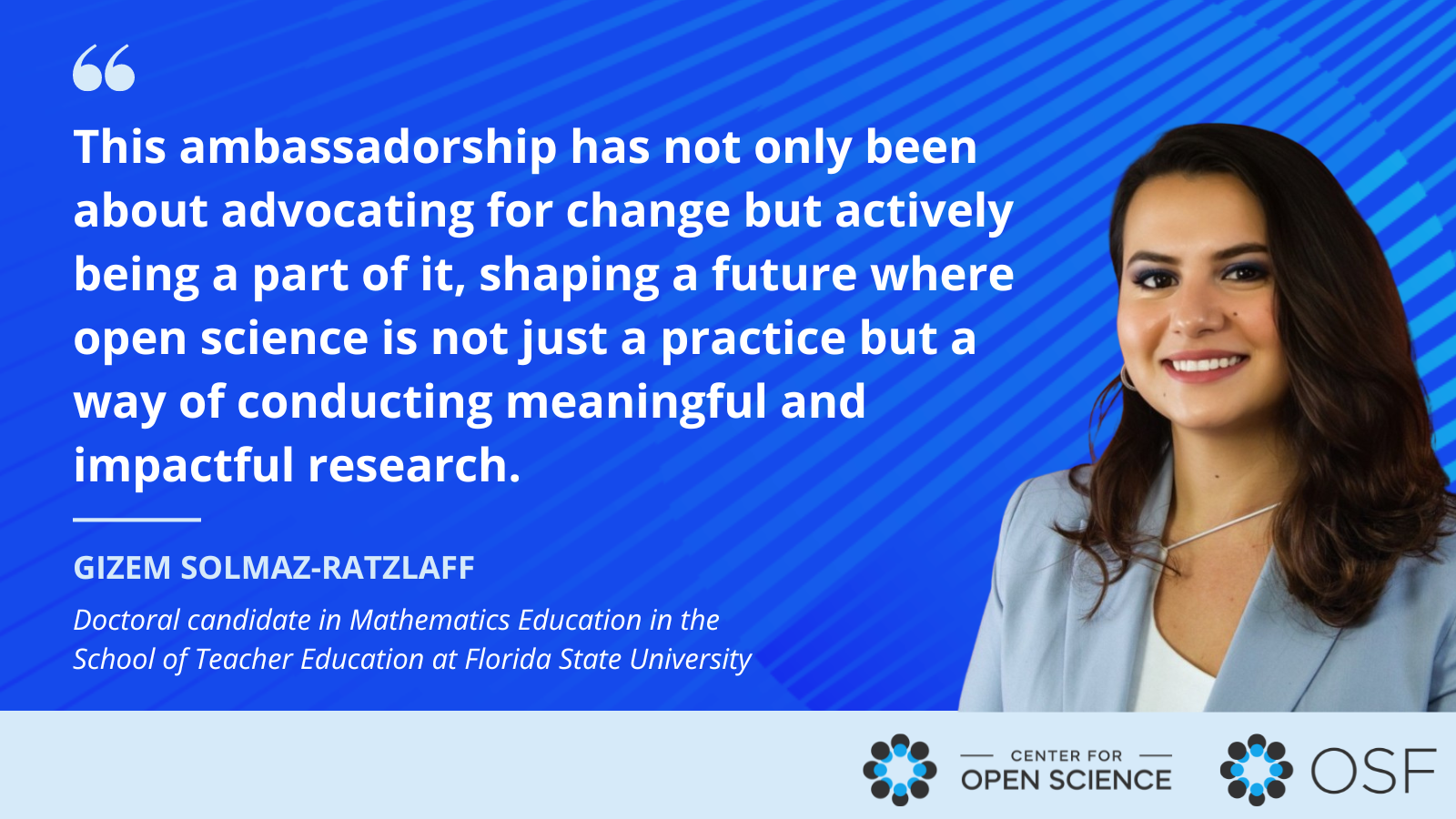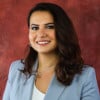
Embarking on a mission to advance open science practices at Florida State University studying Mathematics Education, I took on the role of an ambassador for the Center for Open Science (COS) two years ago. This transformative journey not only allowed me to contribute to the greater cause of open science in my community but significantly impacted my personal and professional development. As an ambassador, the experience not only refined my research practices but also had a profound effect on my network, ultimately elevating the quality of the work I produced.
In the journey of advancing open science, connecting, growing, dialoguing, training, and representing have become integral facets extending beyond advocacy. Connecting involves creating a collaborative framework where researchers unite under the common goal of advancing open science, focusing on nurturing a community with a shared commitment to transparent and collaborative research. The growth of the open science community is assessed qualitatively, cultivating an environment where researchers integrate open science practices as fundamental aspects of their research ethos. Dialoguing goes beyond conversation, fostering a space where diverse perspectives converge on the COS blog, becoming catalysts for change. Training is about empowering researchers with tools for reproducible practices, serving as a cornerstone for building a community capable of steering the cultural shift towards open science. Representing at meetings and conferences involves active collaboration with COS to promote open science practices, embodying the face of a community committed to shaping the future of research.
As I reflect on this journey, the impact goes beyond the professional realm. It transcends into a personal transformation—a deepened commitment to the principles of open science, a widened network of like-minded individuals, and an enhanced ability to contribute meaningfully to the academic landscape. This ambassadorship has not only been about advocating for change but actively being a part of it, shaping a future where open science is not just a practice but a way of conducting meaningful and impactful research.
Connecting and Growing
One of the main objectives of my ambassadorship was to foster connections and foster the growth of the open science community through collaboration and information sharing. Engaging in various initiatives and events, I actively worked to establish a network of like-minded individuals who shared a passion for advancing open science. In pursuit of this goal, I began seeking out individuals within my institute who also harbored a fervor for open science, leading me to discover the Open Scholars Project (OSP).
My involvement with the OSP proved to be a rewarding initiative. I was fortunate to take on a role in the organizing committee representing COS for the 2023 Open Scholars Project Symposium held at Florida State University. During this symposium, we had the honor of hosting keynote speakers from diverse institutions, including COS. This experience not only allowed me to contribute to the organization of a significant event but also provided an opportunity to collaborate with professionals who shared a common dedication to advancing open science practices.
Left to right: Roxann Mouratidis, Camille Thomas, Kassidy Hof-Mahoney, Gizem Solmaz-Ratzlaff, and Jonathan DaSo
Dialoguing and Sharing Perspectives
The COS blog has become a crucial platform for sharing perspectives and engaging in meaningful dialogues about open science. By actively contributing to the blog and encouraging others to do the same, we have cultivated an environment where diverse voices can be heard. These online conversations have broadened our understanding of open science and strengthened the sense of community and shared purpose among participants.
This marks my second occasion sharing a blog post with the COS. I had the privilege of discussing our OSF journey with my academic adviser, Dr. Robert Schoen. This opportunity allowed us to delve into the intricacies of our experiences and insights, contributing to the ongoing discourse within the open science community.
Training and Supporting Reproducible Practices
Empowering researchers with the necessary tools and skills for reproducible practices was another cornerstone of my ambassadorship. Collaborating with COS, we organized training sessions focused on effectively utilizing the OSF and other tools that support reproducibility. These training sessions played a pivotal role in equipping researchers with the knowledge and tools needed to conduct rigorous and transparent research.
I have delivered webinars and training presentations through FSU Libraries, where I had the pleasure of training participants in both virtual and in-person events. Additionally, I was invited to share my experiences with researchers in Power-Issues in Data Management in Education Research Hub. Furthermore, this January, I presented at Washington University in St. Louis (WashU), where I walked through a practical application of OSF for a research study.
Representing at Meetings and Conferences:
To enhance the impact of open science practices, I actively represented COS by partnering with them to promote open science at various meetings and conferences. This entailed advocating for the adoption of open science principles, sharing success stories, and encouraging researchers to embrace transparent and collaborative research methodologies. The partnerships formed during these events further strengthened the global network committed to advancing open science. I had the opportunity to present at the Unconference 2023 Open Scholarship Practices in Education Research, PME-NA – North American Chapter of the International Group for the Psychology of Mathematics Education (PME-NA) in Reno, Nevada, as well as in departmental seminars.
Impact on Networking and Academic Growth
Through these endeavors, the impact on networking and academic growth has been palpable. The open science community has expanded, with researchers from diverse fields coming together to champion transparent and collaborative research. The connections made during workshops, webinars, and conferences have led to collaborative research projects, shared resources, and a collective commitment to advancing the principles of open science.
Navigating Challenges
While the ambassadorship for the COS has been a rewarding journey, it hasn't been without its challenges. One hurdle involved fostering engagement within the open science community. In my experience, there was some resistance to the adoption of open science practices which required innovative approaches to communication and education in order to overcome.
Additionally, balancing the responsibilities of connecting, growing, dialoguing, training, and representing within a limited timeframe presented logistical challenges. The dynamic landscape of open science practices, marked by evolving technologies and methodologies, required constant adaptation to ensure the relevance and effectiveness of training initiatives.
Furthermore, representing COS at meetings and conferences involved navigating differing perspectives and priorities within the academic landscape. Advocating for open science practices often required diplomacy and strategic communication to convey the value proposition effectively.
In the face of these challenges, COS demonstrated remarkable responsiveness. Technical Community Manager Daniel Steger, in particular, played a pivotal role. Whenever challenges arose, Daniel met with me promptly, offering invaluable support and providing the necessary documents and resources. This responsiveness not only facilitated the resolution of challenges but also underscored COS's commitment to the success of its ambassadors. These instances of collaboration and support have been instrumental in overcoming obstacles and ensuring my continued effectiveness in promoting open science principles.

Left to right: Daniel Steger, Technical Community Manager at COS and Gizem Solmaz-Ratzlaff, COS Ambassador
Reflecting on a Transformative Two Years
As my first two years as a COS ambassador comes to a close, I reflect on the journey with immense gratitude. The impact on networking and academic growth has been profound, and the seeds planted for a more open and collaborative scientific community are beginning to bear fruit. I am optimistic about the continued growth of the open science movement and the positive influence it will have on the future of research.
Embark on the journey of sharing your ambassadorship story with us – a narrative of impact, growth, and collaboration. Your experiences resonate, and your insights can inspire. Let's amplify the collective voice of ambassadors and illuminate the diverse paths that lead to positive change. If you would like to share your story, reach out to contact@cos.io.
About the author
 Gizem Solmaz-Ratzlaff is a doctoral candidate in Mathematics Education in the School of Teacher Education at Florida State University and serves as a COS Ambassador.
Gizem Solmaz-Ratzlaff is a doctoral candidate in Mathematics Education in the School of Teacher Education at Florida State University and serves as a COS Ambassador.

6218 Georgia Avenue NW, Suite #1, Unit 3189
Washington, DC 20011
Email: contact@cos.io

Unless otherwise noted, this site is licensed under a Creative Commons Attribution 4.0 International (CC BY 4.0) License.
Responsible stewards of your support
COS has earned top recognition from Charity Navigator and Candid (formerly GuideStar) for our financial transparency and accountability to our mission. COS and the OSF were also awarded SOC2 accreditation in 2023 after an independent assessment of our security and procedures by the American Institute of CPAs (AICPA).
We invite all of our sponsors, partners, and members of the community to learn more about how our organization operates, our impact, our financial performance, and our nonprofit status.